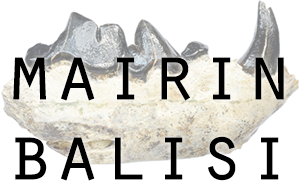Opportunities
A paid summer research internship for undergraduates from UC Merced from June 8 – 28, 2025.
Application deadline: May 23, 2025
Wolf BITE (Biodiversity In “Tar pit” Ecosystems) is a three-week paid research internship based at the Raymond M. Alf Museum of Paleontology in Claremont, California, in summer 2025.
Since 2022, researchers at the Alf Museum, the University of California - Merced, and the University of California Museum of Paleontology (UCMP) in Berkeley have collaborated on a project called “Wolf RACE (Resource Availability and Competition in Ecosystems): Insights from The McKittrick and Rancho La Brea Lagerstätte”. This project investigates the life and death of wolf-like predators - the dire wolf Aenocyon dirus and coyote Canis latrans - toward the end of the last Ice Age (latest Pleistocene to early Holocene), a period of massive ecological and environmental change.
How did dire wolves succumb to the Ice Age extinctions even as coyotes survived? To answer this question, the project leverages the fossil record from an understudied locality: the McKittrick asphalt seeps in Kern County, California. McKittrick’s inland location in the Central Valley - a region poised to experience increasing impacts from rapid anthropogenic change - provides a valuable counterpoint to the much better-known coastal record at the La Brea Tar Pits in Los Angeles, broadening our understanding of this crucial period that set the stage for modern-day ecosystems.
The program will train a cohort of three undergraduates in biodiversity research under the mentorship of Dr. Mairin Balisi, Augustyn Family Curator of Paleontology at the Alf Museum and a Researcher Fellow at the University of California, Merced, to study the paleoecology of dire wolves and coyotes before and after the megafaunal extinctions and climatic transitions at the end of the last Ice Age.
Interested in applying? Read on!
About
The program will bring three undergraduates to the Alf Museum for a three-week research experience. Participants will work closely with Dr. Mairin Balisi on a research project integrating various aspects of comparative biology, including conservation biology, paleontology, and vertebrate morphology.
Interns will study biodiversity as preserved in natural-history and paleontological collections, learning analytical techniques relevant to the project. The program begins with a remote morphology workshop, during which interns will collect initial measurements and practice gathering data before moving on-site to Los Angeles County (Los Angeles and Claremont), California, visiting museum collections in person to collect data.
In addition to the research project, interns will participate in museum-based programming including collections tours, career-building workshops and networking, and time in exhibit spaces directly communicating science with the public. At the end of the program, students may have the opportunity to disseminate their results to the Alf Museum community and will be encouraged to attend a scientific meeting to present their findings to a wider audience.
The Alf Museum is located in Claremont, California, on the eastern end of Los Angeles County. The program will run full-time (35 hours / week) for three weeks, from June 8 – 28, 2025. The first two weeks of the program will be based at partner institutions in Los Angeles, with the last week at the Alf Museum.
Funding
Participants will receive a stipend at the conclusion of the program equivalent to an hourly rate of $17.00.
Who Should Apply?
The program aims to provide opportunities in biodiversity research for the next generation of creative natural-history scientists from UC Merced. Previous research experience is not required, excellent grades and extracurriculars will be considered but are not the only selection criteria, and a demonstrated interest in the natural world will be viewed positively.
Applying
The application process is entirely online.
Send your completed application form to mbalisi@ucmerced.edu, rtrayler@ucmerced.edu, and skim380@ucmerced.edu by Friday, May 23, 2025.
Email Dr. Balisi at mbalisi@ucmerced.edu if you have questions.
We will notify all applicants of their final status in the week starting May 26.

